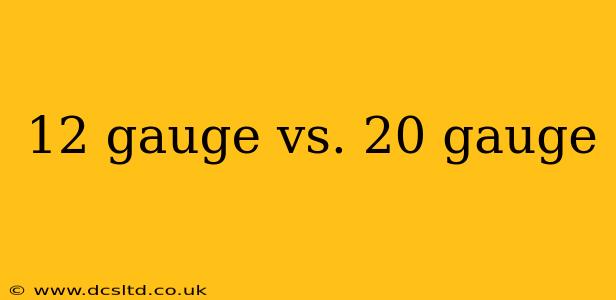Choosing between a 12-gauge and a 20-gauge shotgun is a common dilemma for both novice and experienced shooters. The best choice depends heavily on your intended use, physical capabilities, and personal preferences. This detailed comparison will help you understand the key differences and make an informed decision.
What are the Key Differences Between 12 Gauge and 20 Gauge Shotguns?
The most significant difference lies in the gauge, which refers to the diameter of the shotgun's barrel. A 12-gauge shotgun has a larger bore than a 20-gauge. This translates to several important distinctions:
-
Shell Size and Power: 12-gauge shotguns fire larger, more powerful shells, resulting in greater stopping power and a wider spread of shot. 20-gauge shells are smaller and less powerful, producing less recoil.
-
Recoil: This is a major consideration. The larger, more powerful 12-gauge shells generate considerably more recoil, making it more challenging for some shooters, especially beginners or those with smaller builds. The 20-gauge offers a milder recoil, making it more comfortable for extended shooting sessions.
-
Weight: Generally, 12-gauge shotguns are heavier than 20-gauge shotguns, contributing to the management of recoil. However, a heavier gun can also be more tiring to carry and handle.
-
Versatility: 12-gauge shotguns offer greater versatility in ammunition choices. A wider range of shot sizes, slugs, and specialized ammunition is available.
Which Gauge is Better for Home Defense?
12 Gauge for Home Defense:
Many proponents argue the superior stopping power of the 12-gauge makes it the ideal home-defense weapon. The larger shot pattern can offer a wider spread, increasing the chance of hitting a target, even at closer ranges. The significant stopping power is also a critical factor.
20 Gauge for Home Defense:
However, the 20-gauge's manageable recoil allows for faster follow-up shots, crucial in a high-stress home-defense situation. The reduced recoil also contributes to improved accuracy under pressure. For smaller-framed individuals, the lighter weight and lower recoil of the 20-gauge might be more advantageous. The reduced noise is also considered a positive in some scenarios.
Which Gauge is Better for Hunting?
The ideal gauge for hunting depends greatly on the game being hunted.
12 Gauge for Hunting:
The 12-gauge's power makes it suitable for larger game like deer (with slugs) or waterfowl (with appropriate shot sizes). Its versatility is a significant advantage, allowing for the use of various ammunition types for different hunting scenarios.
20 Gauge for Hunting:
The 20-gauge is often preferred for smaller game such as upland birds, rabbits, and squirrels. Its lighter weight and reduced recoil make it more comfortable for all-day hunting trips. While effective on smaller game, the 20-gauge may not always provide the stopping power required for larger animals at longer ranges.
Which Gauge is Better for Beginners?
Many shooting instructors recommend the 20-gauge for beginners. The reduced recoil allows for easier learning and helps prevent developing bad shooting habits due to flinching or anticipating the powerful recoil of a 12-gauge. The more comfortable shooting experience encourages practice and improved skills.
What About the Cost Difference Between 12 Gauge and 20 Gauge?
Generally, 12-gauge shotguns and ammunition tend to be less expensive than their 20-gauge counterparts. The wider availability of 12-gauge gear contributes to this price difference.
Which Gauge is Lighter and Easier to Carry?
The 20-gauge is noticeably lighter and easier to carry, especially during extended periods of hunting or sporting clays. This is a major advantage for individuals who prioritize comfort and maneuverability.
This comprehensive comparison provides a clear understanding of the differences between 12-gauge and 20-gauge shotguns. Ultimately, the best choice depends on your individual needs and shooting experience. Consider your intended use, physical capabilities, and budget to make the most suitable selection.
